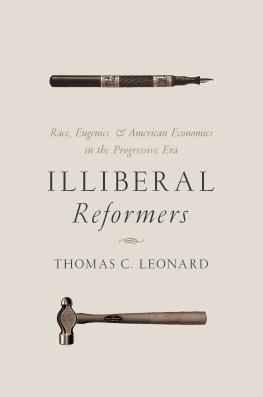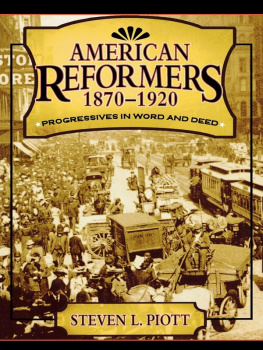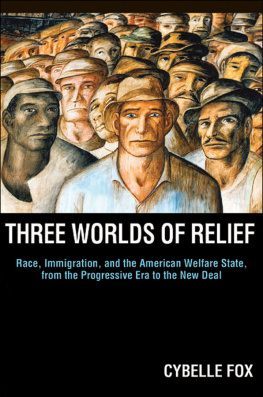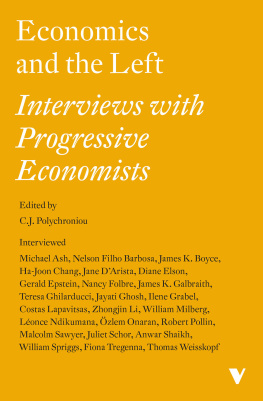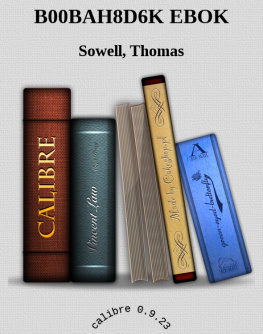Thomas C. Leonard - Illiberal Reformers: Race, Eugenics, and American Economics in the Progressive Era
Here you can read online Thomas C. Leonard - Illiberal Reformers: Race, Eugenics, and American Economics in the Progressive Era full text of the book (entire story) in english for free. Download pdf and epub, get meaning, cover and reviews about this ebook. year: 2017, publisher: Princeton University Press, genre: Politics. Description of the work, (preface) as well as reviews are available. Best literature library LitArk.com created for fans of good reading and offers a wide selection of genres:
Romance novel
Science fiction
Adventure
Detective
Science
History
Home and family
Prose
Art
Politics
Computer
Non-fiction
Religion
Business
Children
Humor
Choose a favorite category and find really read worthwhile books. Enjoy immersion in the world of imagination, feel the emotions of the characters or learn something new for yourself, make an fascinating discovery.
- Book:Illiberal Reformers: Race, Eugenics, and American Economics in the Progressive Era
- Author:
- Publisher:Princeton University Press
- Genre:
- Year:2017
- Rating:5 / 5
- Favourites:Add to favourites
- Your mark:
- 100
- 1
- 2
- 3
- 4
- 5
Illiberal Reformers: Race, Eugenics, and American Economics in the Progressive Era: summary, description and annotation
We offer to read an annotation, description, summary or preface (depends on what the author of the book "Illiberal Reformers: Race, Eugenics, and American Economics in the Progressive Era" wrote himself). If you haven't found the necessary information about the book — write in the comments, we will try to find it.
Thomas C. Leonard: author's other books
Who wrote Illiberal Reformers: Race, Eugenics, and American Economics in the Progressive Era? Find out the surname, the name of the author of the book and a list of all author's works by series.
Illiberal Reformers: Race, Eugenics, and American Economics in the Progressive Era — read online for free the complete book (whole text) full work
Below is the text of the book, divided by pages. System saving the place of the last page read, allows you to conveniently read the book "Illiberal Reformers: Race, Eugenics, and American Economics in the Progressive Era" online for free, without having to search again every time where you left off. Put a bookmark, and you can go to the page where you finished reading at any time.
Font size:
Interval:
Bookmark:
ILLIBERAL
Reformers
Race, Eugenics & American Economics in the Progressive Era
ILLIBERAL
Reformers

THOMAS C. LEONARD
PRINCETON UNIVERSITY PRESS
PRINCETON AND OXFORD
Copyright 2016 by Princeton University Press
Published by Princeton University Press, 41 William Street,
Princeton, New Jersey 08540
In the United Kingdom: Princeton University Press, 6 Oxford Street,
Woodstock, Oxfordshire OX20 1TW
press.princeton.edu
All Rights Reserved
Quote on page 1 reprinted with the permission of Free Press, a Division of Simon & Schuster, Inc., from The Idea Brokers: Think Tanks and the Rise of the New Policy Elite by James A. Smith. Copyright 1990 by James Allen Smith. All rights reserved.
Library of Congress Cataloging-in-Publication Data
Leonard, Thomas C., 1960 author.
Illiberal reformers : race, eugenics, and American economics in the Progressive era / Thomas C. Leonard.
pages cm
Includes index.
ISBN 978-0-691-16959-0 (hardcover : alk. paper) 1. EconomicsUnited StatesHistory. 2. Progressivism (United States politics)History. 3. EugenicsUnited StatesHistory. 4. United StatesEconomic conditions18651918. 5. United StatesEconomic policyTo 1933. 6. United StatesSocial conditions18651918. I. Title.
HC105.L46 2016
330.973'091dc23
2015023243
British Library Cataloging-in-Publication Data is available
This book has been composed in Garamond Premier Pro
Printed on acid-free paper.
Printed in the United States of America
1 3 5 7 9 10 8 6 4 2
CONTENTS

PART I
The Progressive Ascendancy
PART II
The Progressive Paradox
ACKNOWLEDGMENTS

A book, like any manufacture, is the product of many helping hands. An author stands in for the many others who have made intellectual and personal contributions. Every paragraph of Illiberal Reformers incurs a debt of some kind, and only a few can be acknowledged here.
Princeton University gave sabbatical time for research and writing. David Levy and Sandy Peart blazed the trail and are models of scholarly generosity. I am especially grateful for the advice and support of Malcolm Rutherford, who read the entire manuscript, as did Steve Medema. Both made the book better. Three anonymous referees for Princeton University Press gave the manuscript a scrupulously close and thoughtful reading. Their critical responses improved the book in significant ways, even if they would have told the story differently. Dan Rodgers long ago provided encouragement and read a portion of the final manuscript.
Parts of the book have been tried out in seminars over the years. Scholars at Princeton, Duke, New York University, George Mason, and many other places sharpened my arguments, both when they liked them and when they didnt. Peter Dougherty, my editor at Princeton University Press, gave the book its title and provided sage counsel. The wise and wonderful Carol Rigolot encouraged the project and is dearly missed at Princeton.
Some of the raw materials of Illiberal Reformers were published in the History of Political Economy. I thank HOPE for letting me revise, enlarge, and rework portions of: More Merciful and Not Less Effective: Eugenics and Progressive-Era American Economics. HOPE 35(4): 709734; Mistaking Eugenics for Social Darwinism: Why Eugenics Is Missing from the History of American Economics. HOPE 37(supplement): 195228; American Economic Reform in the Progressive Era: Its Foundational Beliefs and Their Relation to Eugenics. HOPE 41(1): 109141; and Religion and Evolution in Progressive Era Political Economy: Adversaries or Allies? HOPE 43(3): 429469.
Illiberal Reformers I dedicate to four extraordinary Leonard women. My mother, Bonnie, inspired me to write it. My wife, Naomi, made the book possible. If her patience, wisdom, and generosity have bounds, I have not found them. This book was conceived when my daughters, Amara and Lilian, were girls. They are now young women, part of the presents dialogue with the past about the future, which is theirs.
PROLOGUE

Illiberal Reformers tells the story of the progressive scholars and activists who led the Progressive Era crusade to dismantle laissez-faire, remaking American economic life with a newly created instrument of reform, the administrative state. If many of their names are unfamiliar today, the progressives changed everything, permanently altering the course of Americas economy and its public life.
American economic reform acquired its scientific and political authority during the turbulent economic times between the collapse of Reconstruction in 1877 and the US entry into the First World War in 1917. During these four decades, the period of the Gilded Age and the Progressive Era, the United States became a modern, urban, industrial, and multicultural world power, its spectacular rise propelled by an industrial revolution that transformed America. The vital national issues of the late nineteenth centuryeconomic depression, financial panic, labor conflict, money wars, big business, immigration, and the tariffwere economic in nature, and public discourse placed economics at the center of a vigorous national debate over where and how government should respond to the consequences of an economic transformation that reached into the countrys remotest corners.
of Illiberal Reformers tells the story of the progressives ascendancy, in three acts. In the first act, seizing the opportunity of recurring economic crisis, the progressives, many of them Protestant evangelicals on a self-appointed mission to redeem America, turn professional, finding different ways to make reform a vocation. The progressive economists completely remade the nature and practice of their own enterprise. From 1880 to 1900, both fostering and benefiting from a revolution in American higher education, the progressive economists established economics as a university discipline, transforming American political economy from a species of public discourse among gentlemen into an expert, scientific practiceeconomics.
Other economic progressives brokered their ideas in journalism, in reform organizations, in the community, and in public life. But they too were engaged with fundamentally economic questionsunemployment, low wages, long hours, workplace safety, industrial consolidation, immigration, and moreand they too undertook social investigations designed to produce economic knowledge and to influence public opinion and policymakers. The progressives gave us the professor of social science, the scholar-activist, the social worker, the muckraking journalist, and the economic expert advising or serving in government.
In the second act, the economic progressives forged the new authority of social science into rhetorical weapons, helping convince Americans and their political leaders that laissez-faire was both economically outmoded and ethically inadequate. Industrial capitalism, progressives said, created conflict and dislocation, operated wastefully, and distributed its copious fruits unjustly. Moreover, the new economy featured novel organizational formstrusts, natural monopolies, industrial corporations, and industrial labor unionsand a rapidly increasing economic interdependence wrought by the furious pace of economic growth. Free markets, to the extent they ever could, no longer self-regulated. Progress, the economic progressives argued, now required the visible hand of a powerful administrative state, guided by expert social scientistsa model of economic governance progressives borrowed from scientific management.
Next pageFont size:
Interval:
Bookmark:
Similar books «Illiberal Reformers: Race, Eugenics, and American Economics in the Progressive Era»
Look at similar books to Illiberal Reformers: Race, Eugenics, and American Economics in the Progressive Era. We have selected literature similar in name and meaning in the hope of providing readers with more options to find new, interesting, not yet read works.
Discussion, reviews of the book Illiberal Reformers: Race, Eugenics, and American Economics in the Progressive Era and just readers' own opinions. Leave your comments, write what you think about the work, its meaning or the main characters. Specify what exactly you liked and what you didn't like, and why you think so.

